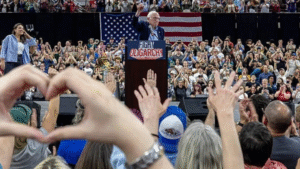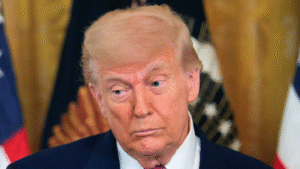NYU’s Controversial Commencement Speech Sparks National Debate Over Free Speech and Political Expression
NYU Commencement Controversy: Diplomas Withheld After Logan Rozos Pro-Palestinian Speech
New York University recently became the center of intense controversy following its decision to invite a pro-Palestinian activist as a commencement speaker, igniting a nationwide debate about the boundaries of free speech and political expression at academic institutions. The commencement event, traditionally a moment of celebration for graduates and their families, was overshadowed by the speaker’s vocal stance on the Israeli-Palestinian conflict, which many considered divisive and provocative. The speaker’s remarks explicitly criticized U.S. foreign policy and called for solidarity with Palestinian rights, sparking backlash from some students, alumni, and political figures who argued that the platform was being misused to promote a highly charged political agenda.
Conversely, supporters defended the university’s commitment to free speech and the importance of including diverse, even controversial, perspectives in academic dialogue. The event also triggered a broader discussion about the role universities play in balancing open discourse with sensitivity to diverse student bodies. This debate intensified when NYU reportedly withheld the diploma of a graduate who publicly supported the pro-Palestinian cause at the event, further fueling controversy. Critics condemned the university’s action as a punitive measure that stifles dissent, while the administration claimed it was a response to violations of university policy. The incident quickly gained widespread media attention, with coverage spanning major news outlets and social media platforms, highlighting deep divisions within and beyond the academic community. Ultimately, NYU’s commencement controversy has become a flashpoint for larger questions about academic freedom, political activism, and institutional authority in higher education.
The Backlash and Support Surrounding NYU’s Pro-Palestinian Commencement Speaker
The backlash against NYU’s decision to feature a pro-Palestinian activist as the commencement speaker was swift and multifaceted, involving a range of voices from political leaders, media commentators, and members of the public. Several prominent figures publicly condemned the university, accusing it of endorsing a narrative they described as inflammatory and biased against Israel. These critics argued that a commencement speech should unite graduates rather than deepen political divides, emphasizing that the timing and platform were inappropriate for such contentious issues.
Additionally, Jewish advocacy groups expressed concern about the speech’s content, labeling it as part of a larger pattern of anti-Israel sentiment in academic settings. At the same time, student activists and free speech advocates rallied in defense of NYU’s choice, arguing that universities must remain spaces where difficult and politically sensitive topics are openly discussed. They emphasized the importance of amplifying marginalized voices, including those advocating for Palestinian rights, especially given the global spotlight on human rights issues. The situation was further complicated by NYU’s reported withholding of a diploma from a graduate who prominently displayed a pro-Palestinian message, which some viewed as a violation of student rights. Supporters of this graduate argued that the university’s response undermined the very principles of free expression that academic institutions claim to uphold. The incident sparked protests and calls for institutional transparency, demanding clarification on policies related to student speech and disciplinary actions. Overall, the backlash and support reflect broader societal tensions surrounding the Israeli-Palestinian conflict and the challenge universities face in navigating politically charged environments.
NYU’s Response and the Broader Implications for Academic Freedom and Student Rights
In response to the uproar, NYU’s administration issued statements defending its decisions while attempting to quell growing unrest within the campus community. The university reiterated its commitment to free speech and academic freedom but also highlighted the need to maintain decorum and adherence to institutional policies during official events. Regarding the diploma withholding, NYU cited specific violations of university codes of conduct as justification, though critics argued these reasons were vague and insufficiently transparent. The administration promised to review its disciplinary procedures and engage in dialogue with student groups to rebuild trust.
Meanwhile, legal experts and civil rights organizations began scrutinizing the case, raising questions about potential infringements on students’ constitutional rights and the limits of university authority. The controversy has prompted a nationwide conversation about how universities can uphold free expression while fostering inclusive environments free from harassment or intimidation. It also underscores the complexities universities face when political activism intersects with academic traditions and administrative governance. As other universities observe the fallout from NYU’s incident, many are revisiting their policies on commencement speakers, student expression, and disciplinary measures. The case may set a precedent influencing how future conflicts between political expression and institutional regulations are managed in higher education. For students, faculty, and administrators alike, the NYU commencement controversy serves as a cautionary tale highlighting the need for clear policies, open communication, and respect for diverse viewpoints in academic communities.
NYU’s Response and the Aftermath
Following the speech, NYU officials stated that Rozos had deviated from his approved speech and used the platform to express personal political views. University spokesperson John Beckman condemned the remarks, stating that the audience was subjected to inappropriate content. In the aftermath, Rozos’s online profiles were deactivated, and discussions about the incident ignited debates on campus regarding free speech and the university’s policies.
Broader Implications for Free Speech
The incident at NYU has sparked a wider conversation about the balance between free speech and institutional policies. Critics argue that the university’s actions may suppress important political discourse, especially concerning international human rights issues. Supporters of Rozos contend that his speech was a legitimate exercise of free expression, highlighting the complexities universities face in navigating political speech within academic settings.
Student and Faculty Reactions
In response to the university’s actions, students and faculty members have expressed their concerns. Some students organized walkouts during commencement ceremonies, wearing symbols of solidarity and chanting slogans supporting Palestinian rights. Faculty members have also voiced their support for Rozos, emphasizing the importance of protecting free speech and academic freedom within the university community.
Navigating the Intersection of Speech and Policy
The controversy surrounding Logan Rozos’s commencement speech at NYU underscores the ongoing challenges universities face in balancing free expression with institutional policies. As debates continue, the incident serves as a reminder of the complexities involved in fostering an environment where diverse viewpoints can be expressed and discussed openly.
[USnewsSphere.com / nyu.]





